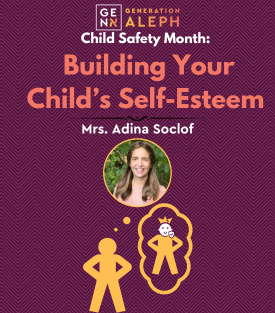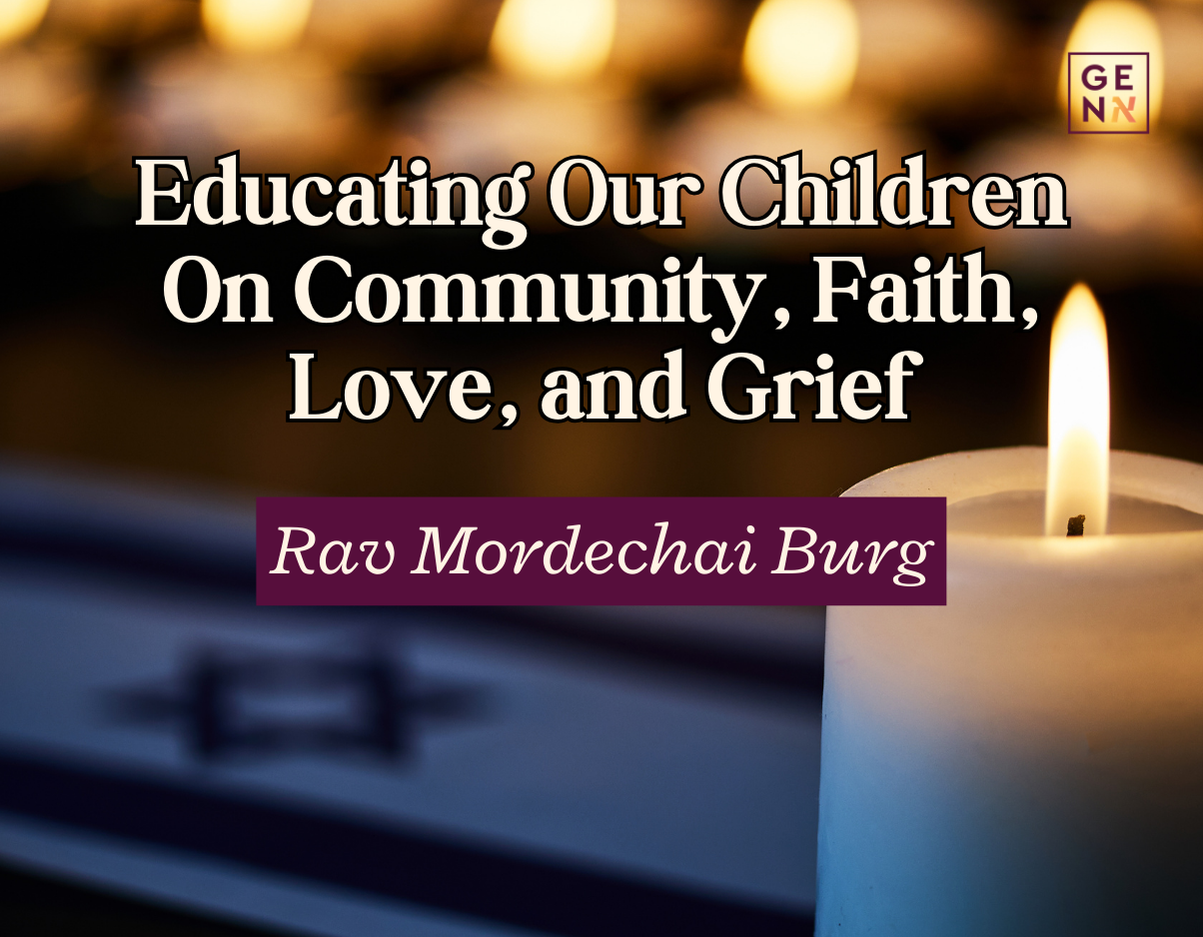Several weeks ago my wife and I had the distinct privilege to attend a Chizzuk Mission Shabbaton (led by the one and only Mrs. Barrie Feld!) in Yerushalayim. I have merited to take part in some of their programming over the course of the last couple of years and I am always left inspired by the women who attend these missions. Their commitment to a more passionate Yiddishkeit energizes my own. Friday night, after the shiur, there was a question and answer session that went for several hours. As I have come to expect from the women who attend these programs, the questions were real. They were deep. They were thoughtful. And sadly, some of them were quite painful. The pain filled questions ranged from toxic relationships to off the derech children and more. All of the questions moved me deeply but this article will focus on one in particular. One of the women described her son (in his early 20s) as a wonderful Baal Middos, a hard worker, a God fearing Jew but one who is not cut out to sit and learn in Yeshiva. She intuited that keeping this particular son in Yeshiva, a place where he was not feeling successful, was not going to be great for his Yiddishkeit and wisely encouraged her son to go out to work so that he could find success. She was confident in her decision but expressed the pain she was feeling as friends and neighbors made awkward comments or gave uncomfortable looks when she described her son to them. Her question was, how can we change the community so that we can be more understanding, tolerant and open to those who take a different path. In my answer I spoke about knowing what we can and cannot control. We can take responsibility for the choices we make for our families and we can educate to the best of our ability but I do not know how we make global shifts in communal thinking. Correctly, she pushed back and asked why community leaders, people who are in a position of influence are not speaking more about these important issues. She argued that these topics should be addressed from Rabbinic pulpits and written about in magazine articles. She’s right. These topics do need to be addressed and while I am far from a community leader or a Rabbi with a pulpit, I have been blessed with this weekly column. Her question obligated me to write this article and I can only be hopeful that it will start a conversation.
וַיִּקְח֣וּ בְנֵי־אַֽ֠הֲרֹ֠ן נָדָ֨ב וַֽאֲבִיה֜וּא אִ֣ישׁ מַחְתָּת֗וֹ וַיִּתְּנ֤וּ בָהֵן֙ אֵ֔שׁ וַיָּשִׂ֥ימוּ עָלֶ֖יהָ קְטֹ֑רֶת וַיַּקְרִ֜יבוּ לִפְנֵ֤י יְהֹוָה֙ אֵ֣שׁ זָרָ֔ה אֲשֶׁ֧ר לֹ֦א צִוָּ֖ה אֹתָֽם: וַתֵּ֥צֵא אֵ֛שׁ מִלִּפְנֵ֥י יְהֹוָ֖ה וַתֹּ֣אכַל אוֹתָ֑ם וַיָּמֻ֖תוּ לִפְנֵ֥י יְהֹוָֽה:
And Aaron’s sons, Nadab and Abihu, each took his pan, put fire in them, and placed incense upon it, and they brought before the Lord foreign fire, which He had not commanded them. And fire went forth from before the Lord and consumed them, and they died before the Lord. (Vayikra 10:1,2)
Much ink has been spilled on the exact nature of the sin of Nadav and Avihu. It is a seemingly extreme punishment for bringing a Korban that Hashem did not command. For this reason, many of the Rishonim explain that they were killed for an unrelated reason (eg. they paskened in front of Moshe, they drank wine before entering the Kodesh HaKedoshim). Rav Moshe Weinbeger shlit”a, Rav of Aish Kodesh in Woodmere, shared the following beautiful approach. The purpose of the Mishkan was that Hashem should appear before Klal Yisrael as the passuk says, “וַיֹּ֣אמֶר משֶׁ֔ה זֶ֧ה הַדָּבָ֛ר אֲשֶׁר־צִוָּ֥ה יְהֹוָ֖ה תַּֽעֲשׂ֑וּ וְיֵרָ֥א אֲלֵיכֶ֖ם כְּב֥וֹד יְהֹוָֽה, And Moshe said, “This is the thing the Lord has commanded; do [it], and the glory of the Hashem will appear to you.” (Vayikra 9:6). The phrase כְּב֥וֹד יְהֹוָֽה, the glory of Hashem, is a familiar one to us. At Har Sinai the Torah tells us: וּמַרְאֵה֙ כְּב֣וֹד יְהֹוָ֔ה כְּאֵ֥שׁ אֹכֶ֖לֶת בְּרֹ֣אשׁ הָהָ֑ר לְעֵינֵ֖י בְּנֵ֥י יִשְׂרָאֵֽל, And the appearance of the glory of Hashem was like a consuming fire atop the mountain, before the eyes of the children of Israel. (Shemos 24:17) It is no accident that the phrase כְּב֥וֹד יְהֹוָֽה appears in both places. The Ramban explains that the purpose of the Mishkan/Beis HaMikdash was to continue the experience of Har Sinai. Just as we encountered God Almighty at Har Sinai so too would we continue to experience His presence in the Mishkan and later on in the Beis HaMikdash. And in line with this approach, just as Ahron’s sons Nadav and Avihu were present at our encounter with Hashem at Har Sinai (Shemos 24:1) it is fitting that they were present at the inauguration of the Mishkan where we would once again encounter Hashem.
With this in mind we can now understand why a communal Korban Shelamim, a peace offering, is only brought on three occasions: Har Sinai, this week’s Parsha (9:4) when the Kohanim are inaugurated in the Mishkan, and on Shavuos. All three dates have a common theme in that these are the days when Klal Yisrael encounters Hashem. Appropriately the Korban Shelamim is consumed by the Kohen, the person offering the Korban and by Hashem. It is a Korban which represents our encounter with Hashem and so its joint consumption is thematically appropriate.
In light of this approach Rav Weinberger shlit”a suggested that this is exactly where Nadav and Avihu fell short.
וַיַּ֥עַל משֶׁ֖ה וְאַֽהֲרֹ֑ן נָדָב֙ וַֽאֲבִיה֔וּא וְשִׁבְעִ֖ים מִזִּקְנֵ֥י יִשְׂרָאֵֽל: וַיִּרְא֕וּ אֵ֖ת אֱלֹהֵ֣י יִשְׂרָאֵ֑ל וְתַ֣חַת רַגְלָ֗יו כְּמַֽעֲשֵׂה֙ לִבְנַ֣ת הַסַּפִּ֔יר וּכְעֶ֥צֶם הַשָּׁמַ֖יִם לָטֹֽהַר: וְאֶל־אֲצִילֵי֙ בְּנֵ֣י יִשְׂרָאֵ֔ל לֹ֥א שָׁלַ֖ח יָד֑וֹ וַיֶּֽחֱזוּ֙ אֶת־הָ֣אֱלֹהִ֔ים וַיֹּֽאכְל֖וּ וַיִּשְׁתּֽוּ:
And Moses and Aaron, Nadab and Abihu, and seventy of the elders of Israel ascended, and they perceived the God of Israel, and beneath His feet was like the forming of a sapphire brick and like the appearance of the heavens for clarity. And upon the nobles of the children of Israel He did not lay His hand, and they perceived God, and they ate and drank. (Shemos 10:9-11)
Nadav and Avihu experienced the encounter with Hashem from upon Har Sinai and not down with the rest of Klal Yisrael. From this vantage point, Nadav and Avihu may have thought that only the royalty of Klal Yisrael were meant to encounter Hashem directly. For the average Jew, God is meant to be experienced from afar. This approach is affirmed when we look at the context of Nadav and Avihu’s Korban. The Torah first tells us:
וַתֵּ֤צֵא אֵשׁ֙ מִלִּפְנֵ֣י יְהֹוָ֔ה וַתֹּ֨אכַל֙ עַל־הַמִּזְבֵּ֔חַ אֶת־הָֽעֹלָ֖ה וְאֶת־הַֽחֲלָבִ֑ים וַיַּ֤רְא כָּל־הָעָם֙ וַיָּרֹ֔נּוּ וַיִּפְּל֖וּ עַל־פְּנֵיהֶֽם:
And fire went forth from before the Lord and consumed the burnt offering and the fats upon the altar, and all the people saw, sang praises, and fell upon their faces. (Vayikra 9:24)
Nadav and Avihu saw the people encountering Hashem directly and ran into the Kodesh HaKedoshim to bring the Ketores.
וַיֹּ֨אמֶר יְהֹוָ֜ה אֶל־משֶׁ֗ה דַּבֵּר֘ אֶל־אַֽהֲרֹ֣ן אָחִ֒יךָ֒ וְאַל־יָבֹ֤א בְכָל־עֵת֙ אֶל־הַקֹּ֔דֶשׁ מִבֵּ֖ית לַפָּרֹ֑כֶת אֶל־פְּנֵ֨י הַכַּפֹּ֜רֶת אֲשֶׁ֤ר עַל־הָֽאָרֹן֙ וְלֹ֣א יָמ֔וּת כִּ֚י בֶּֽעָנָ֔ן אֵֽרָאֶ֖ה עַל־הַכַּפֹּֽרֶת:
And the Lord said to Moses: Speak to your brother Aaron, that he should not come at all times into the Holy within the dividing curtain, in front of the cover that is upon the ark, so that he should not die, for I appear over the ark cover in a cloud. (Vayikra 16:2)
Nadav and Avihu brought the Ketores in order to obscure Hashem’s presence. They understood that God’s encounter with Klal Yisrael should happen in a more modest fashion, through the cloud that comes with the Ketores. For the average Jew it is an affront to the Kavod of Hashem to experience Hashem so intimately.
Had Nadav and Avihu been on the ground at the Sinai revelation they would have understood that Hashem wants to connect with every single Jew directly, not only the noblemen who ascended atop the mountain. After the death of Nadav and Avihu, Moshe explained to Ahron:
וַיֹּ֨אמֶר משֶׁ֜ה אֶל־אַֽהֲרֹ֗ן ה֩וּא אֲשֶׁר־דִּבֶּ֨ר יְהֹוָ֤ה | לֵאמֹר֙ בִּקְרֹבַ֣י אֶקָּדֵ֔שׁ וְעַל־פְּנֵ֥י כָל־הָעָ֖ם אֶכָּבֵ֑ד וַיִּדֹּ֖ם אַֽהֲרֹֽן:
Then Moses said to Aaron, “This is what the Lord spoke, [when He said], ‘I will be sanctified through those near to Me, and before all the people I will be glorified.’ ” And Aaron was silent. (Vayikra 10:3)
The glory of Hashem is experienced not only by those who are near Him but by the entire nation.
Baruch Hashem, Klal Yisrael is learning Torah in volumes that are historically unprecedented. Our Yeshivas are overflowing with young men who are dedicating themselves to serious Torah study. Additionally, Yeshivas provide a safe haven for young men who would otherwise find themselves in places that can be antithetical to a Torah lifestyle. With that said, we all know that not every young man will find his place in Yeshiva. Eventually, almost everyone leaves. It is not a question of if but when. Young men who are “taking losses” every day as they, for whatever reason, are not connecting to life in Yeshiva may be better off leaving. And for some, leaving Yeshiva and entering the workforce can actually enhance their Yiddishkeit. The success they may have in the business world, coupled with the continued commitment to Davening and a some sort of learning schedule can be a more growth oriented experience then the Yeshiva experience. I imagine we all know young men who have had this experience. Some of my closest friends were not necessarily the “top guys” in Yeshiva but went on to lead very committed Jewish lives. They were never cut out for the full time learning schedule but they thrived when they became Baal HaBatim. Our mission as parents is to raise our unique children. We are obligated to raise them to serve Hashem in their own unique way. We should never be embarrassed to do what is right for our children and as a community we should never look askance at those who do. Remember Hashem wants a direct relationship with all of His children, not just those who ascended Har Sinai.
Submit your questions
"*" indicates required fields











